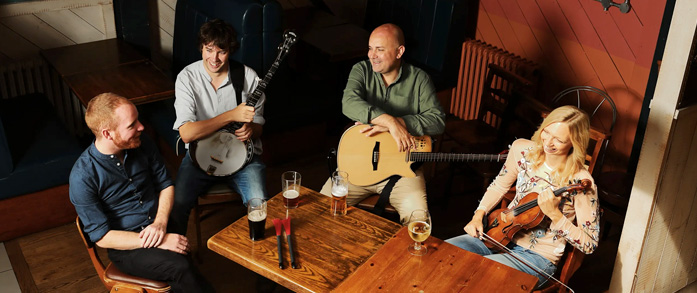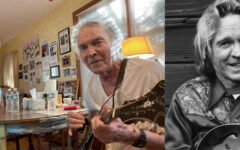
England’s Urban Folk Quartet, known simply as UFQ, tap a seasoned sound in ways that honor an ongoing tapestry of traditional music. Galician fiddler and singer Paloma Trigás shared stages and recorded with the The Chieftains, Sharon Shannon and Altan, as well as Spain’s biggest folk star, Carlos Nuñez. Fiddler, guitarist, and mandolin player Joe Broughton played with the Albion Band, Bellowhead, and Joss Stone. Singer, guitarist and banjo player Dan Walsh — who replaced the band’s since-retired founder, oud and guitar player Frank Walsh — previously performed with the Seth Lakeman Band, The Levellers, and his own duo, Walsh & Pound. Tom Chapman, a veteran of Jacqui McShee’s Circle, While & Matthews, and Russell & Algar, contributes cajón and cymbals, percussion, and vocals.
In a very real sense, UFQ can be considered a true international band. “We’re based in the Midlands of England, with three of us living in Birmingham,” Chapman explained. “That said, between us, we have family roots that encompass various areas of England, Ireland, and Galicia in the North of Spain.”
The name itself is a reflection of those widespread roots. “We call ourselves Urban Folk Quartet because a lot of folk music, particularly in England, can lean towards pastoral, rural themes,” Chapman continued. “Working musicians in our beloved ‘Brum’ — Birmingham — will often find themselves surrounded by, and playing jazz, Indian classical, salsa, hip hop, funk etcetera. As multi-genre multi-instrumentalists, our ‘folk process’ incorporates less of the rustic, and more of the multi-cultural.”
In that regard, UFQ take on what could be considered a genuine progressive posture.
“I should add that our music is heavily influenced by, and rooted in, Celtic dance forms as well as American folk material, but we always have an open ear to the cosmopolitan musical influences that surround us in the UK’s second city,” Chapman noted. “We love traditional approaches, but we couldn’t ever hope to call ourselves genuine trad musicians. We are, however, very true to our own genuine musical backgrounds.”
According to Chapman, those influences are very widespread. “There are many,” he insists. “But I’ll have a go at hitting the big ones. Paloma is highly classically trained, but spent many years touring the world with Galician bagpiper, Carlos Nuñez. Joe was raised on rock and blues, with Jeff Beck, Dave Swarbrick, and Stevie Wonder being huge influences. I’m as inspired by 1940s drum pioneers like Papa Jo Jones and Chick Webb as I am by a host of Afro-Peruvian and Flamenco percussionists and modern rock drummers. Dan plays a singular style of melodic clawhammer that is as useful for playing more traditionally tenor banjo Celtic tunes, as it is for imitating funk rhythm section lines! Whilst he has a deep knowledge of bluegrass and old-time music, he also studied in India and incorporated elements of Indian string playing into his banjo style. Dan really is a true banjo innovator and has won an impressive amount of respect in the States and elsewhere around the world, especially considering he’s an Englishman! His repertoire of American song has also been a big influence since he joined us.”
The band has also benefitted from international touring since their formation in June 2009. In fact, their first four gigs took place in four different countries!
“Between us there’s barely anywhere we haven’t toured,” Chapman said. “Outside of the UK, we’ve been particularly busy in continental Europe, and we’ve also toured in Canada. These days, we tend not to take on long back-to-back tours, and we’re lucky to enjoy some beautiful gigs, from secluded private festivals to major concert halls.”
Those aforementioned festivals have included many of the most prestigious gatherings England, and Europe in general, have to offer.
“Fairport Convention’s Cropredy Convention was a significant one for us,” Chapman suggests. “We’ve also played many of Europe’s biggest festivals, including Dranouter in Belgium, which is Europe’s largest folk/world music festival. Paloma’s reputation from her days with Carlos precedes her, and we’re probably more popular as a big festival act on the continent than we are here in the UK. Celtic music — even and especially with a contemporary twist — is huge in many parts of the continent, and tens of thousands come out to party all night.”
As a result, the band can count any number of acts, artists, and admirers they’ve been fortunate enough to share stages with. They include the Rolling Stones, The Chieftains, Fairport Convention, Violent Femmes, Massive Attack, and Rufus Wainwright, among the many. “Joss Stone is a friend of the band and we’ve loved playing with her live,” Chapman adds. “Joe and Paloma guested on her last album.”
UFQ have also recorded some seven albums of their own, including four studio and three live projects, all of which can be found on their web site. Their latest, True Story, includes a cover of Jim Mills and Ricky Skaggs’ Coal Minin’ Man, and a version of the Sacred Harp classic, Long Time Traveller.
“At this point, our live sets are almost entirely original and our cover songs are mostly traditional or written by others,” Chapman explains. “The new album opens with a banjo-led take on Peter Gabriel’s Solsbury Hill, and there is a re-interpretation of Indian Tea, a song by Roger Wilson based on Robert Frost’s poem, The Road Not Taken.”
It’s hardly surprising then, that UFQ have attracted fans worldwide, from The Bay of Biscay to the edge of the North Pacific.
“We’re very niche, and that particular niche seems to be enjoyed internationally, perhaps a little more than at home,” Chapman muses. “Yet our fanbase continues to grow steadily and we have a real dedicated following here in the UK.”
The press chimed in as well. “UFQ are impossibly wonderful,” declared fRoots. They’re “Seriously exceptional musicians,” insisted R2 (Rock ‘n’ Reel). The BBC Radio 2 Folk Show raved that they are, “Up there with the best of them — amazing musicians.” Songlines‘ Olivia Haughton added, “A sizzling hot ensemble who fuse folk with elements of dub, house, and rock with an ease that shouldn’t naturally follow that list of genres. Built on the rhythms of a cajón-wielding percussionist and oud-playing bassist, the phenomenal fiddlers led the quartet in one of the tightest line-ups I have ever seen.”
Chapman offers his own scholarly explanation of why he believes bluegrass enjoys such ongoing popularity. “Whilst I don’t think I could really call myself a bluegrass musician, per se, I have a special interest in the music through my ethnomusicological work as a lecturer at The University of Chester here in the UK,” he said. “I believe that bluegrass could only arise as the very particular cultural outcome of its original time and place, its constituent influences bring their own tried-and-tested appeal, and combine into something greater than the sum of its parts. Whilst sounding nothing like it, a good comparison might be flamenco. Both forms strike balances of virtuosity with robust foundation, innovation with tradition, energy with control, and pre-existing elements fused only when it serves the music.”







